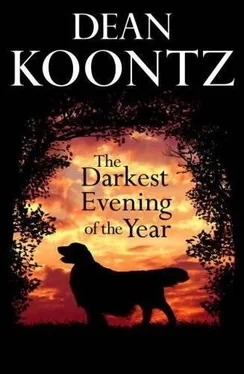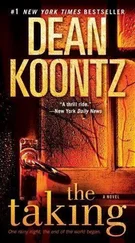With no other indication that the house had been violated, the owner would have to assume that he himself had left a full bowl.
In this instance, Vern intended to leave no calling card. Even if Redwing were disposed to think that she had forgotten to flush, the reaction of at least one of the dogs would probably make her suspicious.
Vern didn’t like dogs, largely because he had never met one that liked him. People stared right through Vern, but dogs gave him long hard looks and invited him to examine their teeth.
In high school, he had been blessed with a rat named Cheesy. A good rat made an excellent pet, affectionate and cute. He and Cheesy had shared many good times, uncountable confidences. Such memories.
Off the kitchen lay a half bath. Vern resisted the temptation of the toilet.
He found nothing of interest in the bath except his reflection in the mirror. He paused to smile at himself.
For most of his life, he had not been charmed by mirrors. In fact he had avoided them.
These days, however, facing a mirror, he didn’t see Vernon Lesley. He saw that lovable rogue Von Longwood, who had a thick head of hair and blue eyes.
In the kitchen again, he sorted through the pizzas, the packages of vegetables, and the containers of ice cream in the freezer. In the pantry, he checked the contents of every box that Redwing had opened, to be sure that it held what the exterior advertised.
When someone wished to hide mementos of another life, they often secreted the evidence in places that, to an inexperienced searcher, would seem to be unlikely repositories. Consequently, he made sure that the box of crackers actually contained crackers and that no tub of chocolate-caramel or strawberry-swirl ice cream contained instead a trove of old love letters.
He wasn’t literally searching for love letters. In Amy Redwing’s other life, she evidently had not been lucky in love or happy.
By contrast, as Von Longwood, Vern had enjoyed sex as often as four times in one day, and his fabulous sports car could fly, as could Von himself.
Renata referred to them as ghost dogs because they were as yet mere shades of the dogs they should have been.
They had been breeder dogs in a puppy mill, housed inhumanely, fed inadequately, and treated cruelly.
The females had been bred at their first heat-usually at six months-and then twice a year. After two or three years, if the stress of their situation prevented them from going into heat again, they would have been shot or abandoned at a county animal shelter.
In this case, the puppy mill had been raided and closed. Eleven female and four male breeder dogs were confiscated. Too sickly and fearful to be fit for adoption, these dogs faced imminent euthanasia.
Golden Heart had taken all fifteen and had brought them to the Hammersmith place, known in the organization as Last Chance Ranch.
Two males and three females had been in such grievous physical condition that they had died within the week, in spite of receiving the first veterinary care of their lives. Some of them had been so terrified of human beings that even a comforting touch would cause them to urinate or vomit in fear.
Their ashes were in urns in the Hammersmith house. A typed label with a name had been taped to each urn.
Renata and Jerry named them because, in puppy mills, breeder dogs have only numbers. No man or dog should die without a name.
Tick-infested, worm-plagued, flea-ridden, malnourished, they had to be shaved and medicated and, in some cases, patiently fed by hand.
The ad placed by the breeding operation to sell their puppies had said “farm-bred, raised by a loving family.”
In the month that followed, though heroic efforts were made to heal the remaining dogs, four had conditions so intractable that, to end their suffering, they had to be put down.
So fearful were they of human beings that they remained wary of being touched even when they were desperate for comforting. In each dog’s final hour, Golden Heart volunteers stroked it, murmured words of love, and held it as its life was, in mercy, given back to God.
Dog rescue is often joyful work, and often grim.
The six survivors were all females: the dogs now lying in the exercise yard, at various distances from Renata and Amy.
In the puppy mill, they had lived in cramped wire cages, without exercise or play. At Last Chance Ranch, this fenced yard had seemed to be a threatening vastness. They had first preferred the kennels.
Taken from the filthy cages at the mill, they had been fearful of every human being, of loud voices, of kindness because they had never encountered it, of cars because they had never ridden in one, of stairs because they had never climbed them, of soap and water because they had never been bathed, of hair dryers and of towels, of music and of the first toys given to them.
Four months later, these survivors had been to a large degree socialized; but they were not yet ready to be placed for adoption. They needed to be less shy to live with a forever family. They were still getting accustomed to lawn mowers and washing machines, still learning to trust slippery tile floors, hardwood floors, stairs.
Now, having said hello to Hugo, Renata’s golden, Fred and Ethel gamboled into the yard, ready for fun, and Hugo went with them. They approached the former breeder dogs. Play bows were exchanged, chases undertaken. Renata had scattered tug toys in the grass, and these were snatched up with glee, dog challenging dog to take the prize.
Nickie did not at once join in their games, but watched with interest the only one of the six surviving girls that was reluctant to participate. Finally, Nickie plucked up a tug toy from beside Renata and trotted across the yard toward the wallflower.
“That’s Honey,” said Renata, naming the shyest of the group.
Honey had been maybe two and a half when she had been rescued. Her toenails had never been trimmed at the puppy mill, and she had not worn them away with exercise, so they had grown back and under her feet to the extent that she could barely stand. Her leg muscles had been somewhat atrophied, as well.
Her feet were healed now, her muscles stronger, but while the concept of play intrigued her, she was always the last into the game, if she joined at all.
Standing before Honey, Nickie tauntingly dangled the tug toy. When this didn’t excite the shy dog, Nickie shook the toy vigorously.
“Your Nickie is a nightingale,” Renata said.
Most dogs were sensitive to illness and depression in people and other dogs, but a few were especially determined to nurture those in need. Amy called them nightingales, after Florence Nightingale.
“She’s something special,” Amy said.
“You haven’t had her a day yet.”
“I hadn’t had her an hour till I knew.”
In but a minute, Nickie had teased Honey into a chase and then a happy tumble.
Amy stood with the binoculars again and scanned the shadows under the jacarandas on the farther side of the county road.
“He get out of the car where you can see him?” Renata asked.
“Nope. Still behind the wheel.”
“Maybe he’s a sonofabitch from one of the puppy mills you’ve put out of business.”
“Maybe.”
“He comes on this property, I’ll put some bird shot in him.”
“You used to say, one of those sonsofbitches ever came around here, you’d neuter him.”
“The bird shot is just to make him cooperative. Then comes the neutering.”
The living room yielded nothing of interest to Vernon Lesley, but in the back of the bedroom closet, he found two shoe boxes full of photographs.
Читать дальше
Конец ознакомительного отрывка
Купить книгу










